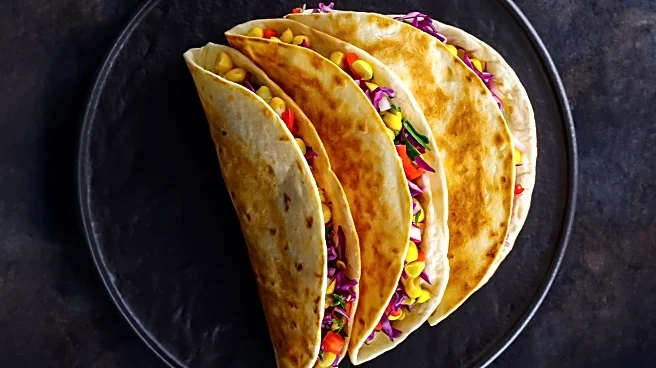What is the story about?
What's Happening?
National Taco Day will be celebrated on Tuesday, October 7, marking a shift from its previous date of October 4. The change was driven by Taco Bell, which advocated for the day to coincide with 'Taco Tuesday,' a popular weekly event. The National Day Calendar officially moved the observance to the first Tuesday of October starting in 2024. Taco Bell's Chief Marketing Officer, Taylor Montgomery, emphasized the strategic alignment with Taco Tuesday, enhancing the celebration of tacos. The change required Taco John's to relinquish its trademark on 'Taco Tuesday,' allowing all restaurants to use the term freely.
Why It's Important?
The move to align National Taco Day with Taco Tuesday is significant for the restaurant industry, particularly for Taco Bell. It allows the company to capitalize on the established popularity of Taco Tuesday, potentially increasing customer engagement and sales. The decision reflects the power of branding and marketing in shaping consumer habits and industry practices. For consumers, the change offers a more cohesive celebration of tacos, with potential deals and promotions from various restaurants. The release of the 'Taco Tuesday' trademark also opens opportunities for other businesses to leverage the term in their marketing strategies.
What's Next?
With the new date set, Taco Bell plans to offer exclusive deals to its Taco Bell Rewards members, including discounts on Party Packs and buy-one-get-one-free tacos through DoorDash. The company will also host a T-shirt giveaway and offer $1 Cantina Chicken Soft Tacos at scheduled times. Other restaurants may follow suit, offering their own promotions to attract customers. The success of the new National Taco Day could lead to further collaborations and marketing initiatives within the food industry. Observers will be watching to see how the change impacts consumer participation and sales.
Beyond the Headlines
The shift in National Taco Day highlights the influence of corporate interests in shaping national observances and cultural practices. It raises questions about the commercialization of food holidays and the role of trademarks in the restaurant industry. The decision may also spark discussions about the balance between tradition and innovation in marketing strategies. As more companies seek to capitalize on popular trends, the move could inspire similar changes in other food-related observances, potentially altering the landscape of national food holidays.















